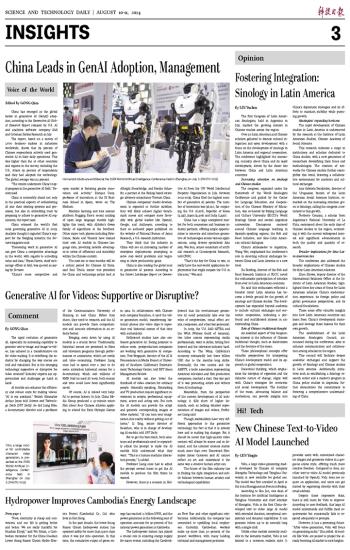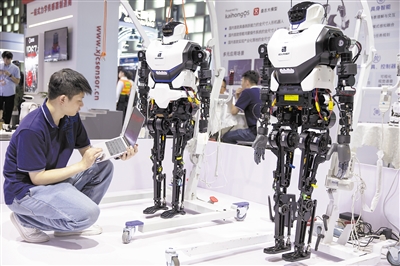
 |
| Humanoid robots are exhibited at the 2024 World Artificial Intelligence Conference held in Shanghai, on July 5. (PHOTO: VCG) |
China has emerged as the global leader in generative AI (GenAI) adoption, according to the Generative AI Global Research Report released by U.S. AI and analytics software company SAS and Coleman Parkes Research in July.
The report, based on a survey of 1,600 decision-makers in industries worldwide, shows that 83 percent of Chinese respondents actively used generative AI in their daily operations. This was higher than the 16 other countries and regions in the survey, including the U.S., where 65 percent of respondents said they had adopted the technology. The global average was 54 percent.
"The results underscore China's rapid progress in the generative AI field," Reuters said.
China is noticeably ahead not only in the practical aspects of orchestrating AI into their existing systems and processes, but also in embedding trust by preparing to adhere to generative AI regulations, the report says.
China released the world's first rules governing generative AI in 2023. Analysts thought it signaled China's support for the fledgling industry, the Fortune magazine said.
"Pioneering work in generative AI can give China a competitive advantage in the world, with regards to unlocking value and data," Bryan Harris, chief technology officer at SAS, was quoted as saying by Fortune.
"China's more competitive and open market is fostering greater innovation and activity," Enrique Dans, professor of innovation at the IE Business School in Spain, wrote on The Medium.
Machine learning and data science platform Hugging Face's recent ranking of open large language models highlights this trend, with Alibaba's Qwen family of algorithms at the forefront. Other major tech players including ByteDance, Baidu and Tencent have trained their own AI models in Chinese-language data, providing notable advantages in terms of efficiency and suitability within the Chinese context.
The next six to nine months will be a critical period for Chinese AI firms, said Paul Triolo, senior vice president for China and technology policy lead at Albright Stonebridge, and Kendra Schaefer, a partner at the Beijing-based strategic advisory consultancy Trivium China.
Chinese companies' model development is expected to further stabilize, they will likely achieve higher benchmark scores and compare more favorably with global leaders like OpenAI, Google, and Anthropic, according to their co-authored paper published on the website of National Bureau of Asian Research, a U.S. research institution.
They think that the industry in China will see an increasing number of enterprise deployments attempting to solve real-world problems and beginning to show productivity gains.
China is also leading the global race in generative AI patents. According to the Patent Landscape Report on Generative AI from the UN World Intellectual Property Organization in July, between 2014-2023, China filed the highest number of generative AI patents. The number of inventions was 38,210, far outpacing the U.S. (6,276), Republic of Korea (4,155), Japan (3,409) and India (1,350).
China has a large unexplored market for both consumers and business industry partners, offering ample opportunities to innovate and introduce generative AI technologies across various applications, using diverse specialized data sets, Wei Sun, senior consultant of artificial research at Counterpoint Research, told CNBC.
"That's the key for China to win, to really have the real-world application deployments that might surpass the U.S. in this area," Wei said.


 Next
Next




